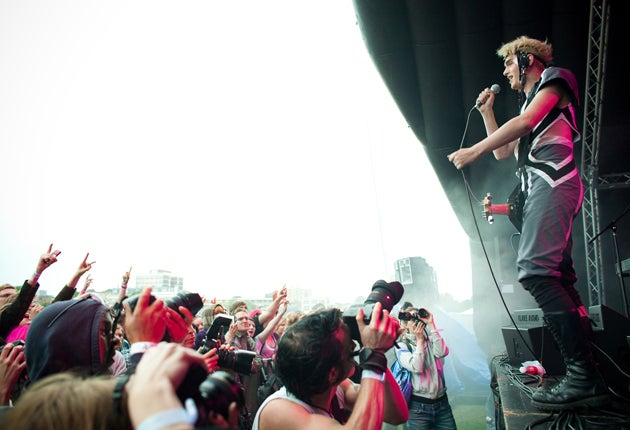1-2-3-4 Shoreditch Festival, Shoreditch, London<br></br>Cornershop, Jazz Café, London
Some bright upstarts ensure spirits aren't too dampened among the pseudo trendies

It's a dismal, drizzling day in Shoreditch Park, a flat, featureless rectangle hemmed in by ugly tenement blocks, a little more than 39 steps from Gainsborough Studios, where Hitchcock made his early films.
Inside the 1-2-3-4 Shoreditch Festival compound squat two marquees and a bouncy castle-like main stage bearing forlorn adverts for trainers and magazines. If you don't like the bands, there's bugger-all else to do. A karaoke tent serves backstage VIPs, but the rest make do with a hook-a-duck stall, three food caravans, and a few bales of straw to sit on (or, perhaps, for chewing). This is how Hoxton likes to party?
The district's horrors and terrors have become noticeably more conformist even since the days of Nathan Barley, Charlie Brooker and Chris Morris's maligned but magnificent six-part Shoreditch sitcom. Glancing at the sparse turnout, the ostentatious pseudo-individualism of handbags worn on heads and Geek Pie hairdos has solidified into a uniform of sorts.
Like its dress sense, its musical output has been crippled by a fatal feedback loop of irony upon irony, but against the odds, a handful of acts recently smashed through all that. I first flagged up An Experiment on a Bird in the Air Pump in January, and six months later the primal grrrl-rock trio have developed into a fearsome proposition. Instrument-swapping between songs is their thing, but on "Lights Out" they hit the ultimate configuration: D-Bird battering seven shades out of the floor-toms, X-Bird nonchalantly plucking a killer scuzz-riff from her bass, and twin sister C-Bird terrorising with her extraordinary voice.
Kasms are another band free of the usual Shoreditch self-consciousness. Sailor-hooped, sequin-hotpanted singer Rachel Mary Callaghan is a tiny star, hyperactively threshing her hair like a heavy metal fan in some old public information film about the perils of headbanging, leaping into cartwheels and doing the dying fly, while whooping like Siouxsie circa "Love in a Void". Although, on songs like "Bone You", Kasms convey a sexuality Sioux herself never expressed. Their super-brief set is curtailed by the organisers, so drummer Rory Brattwell, a former Test Icicle, starts dismantling his kit mid-song. Brilliant.
Nobody seems to know what to make of electro-punk upstarts Ulterior, who look and sound like Axl Rose fronting Holy Bible-era Manics, fed through a NIN filter. When their fractious set ends, people seem unsure of whether it's the best thing they've ever seen, or the worst. I like that.
Over on the main stage, the tweely named Polly Scattergood is surprisingly decent, with her pink marabou shoulder pads and her Toyah-goes-techno tunes. She's essentially a second-rate Lovefoxxx, which might not be so damaging were the real Lovefoxxx not on the same bill (albeit in a DJ capacity).
He may be wearing monochrome, but Patrick Wolf is the brightest burst of colour all day. In his vulture cape, black/white/grey Union Jack jumpsuit, an entire Max Factor display's worth of eyeshadow on his face, a horse's bridle wrapped around his blond head and gold glitter smeared on his chest, he's a defiantly flamboyant figure amid the still-falling rain, a brave and proud believer in love and art and freedom and music in a field of 40-a-day smirkers.
He delivers a rocked-up "Accident and Emergency", a flamenco-stomping "Libertine", and thumping "Bloodbeat". The jubilant majorette march of "The Magic Position" sets umbrellas bouncing, and "Damaris" inspires a couple to kiss like there's no tomorrow. It's an incongruously romantic sight.
As Wolf returns in a robo-owl breastplate, an ignoramus hoping to hasten the arrival of the criminally average Rakes hurls a beaker. Bad move. Patrick yells at the miscreant missile-thrower: "You're the ugliest mutant I've ever seen!" Let the Fashionable East get what the Fashionable East wants. Come, friendly H1N1 virus, and fall on Shoreditch. It isn't fit for humans now.
Across town in Camden – a previous generation's playground – Cornershop are playing their first gig in years. "We've lost a lot of people," says Tjinder Singh, fronting an eight-piece band in which, since the 1995 departure of his brother Avtar, he is the only brown face. "If we mess up, we'll pay you." He pauses for comic timing. "I'm only joking. We won't mess up, and you definitely won't get paid."
Mess up? No. Messy? Yeah. There's an attractive slackness to Cornershop now, their four guitarists lazily knocking out Keef Richards riffs on songs such as "Who Fingered Rock'n'Roll?", "Lessons Learned from Rocky I to Rocky III", "Sleep on the Left Side" and "Roll Up Characteristic". Who knew, back in the lo-fi days of the early Nineties, that Cornershop's biggest influence would turn out to be the Rolling Stones? But then, what did we ever know for sure about Cornershop? Were they players in the rise of Asian-British confidence, or just an indie band who happened to think sitars sounded cool? Certainly, plenty about them was political, with a small or a large P, and their version of "Norwegian Wood", sung in Hindi and deftly reclaiming Indian sounds from The Beatles, was too. It's a highlight tonight.
Tjinder's own lyrics are always interesting, and often overlooked. "Brimful of Asha" itself was a potent cultural statement, pointing out that singers like Bhosle were as important in his youth as rock'n'roll was to any of us. Whereas once Cornershop might have delivered a sluggish drone-rock version of it out of spite, tonight it's played somewhere between the relaxed pace of the original and the sugary excitement of the Fatboy Slim single edit. When it ends, nine people walk out. I don't see them ask for their money.
Join our commenting forum
Join thought-provoking conversations, follow other Independent readers and see their replies
Comments
Bookmark popover
Removed from bookmarks